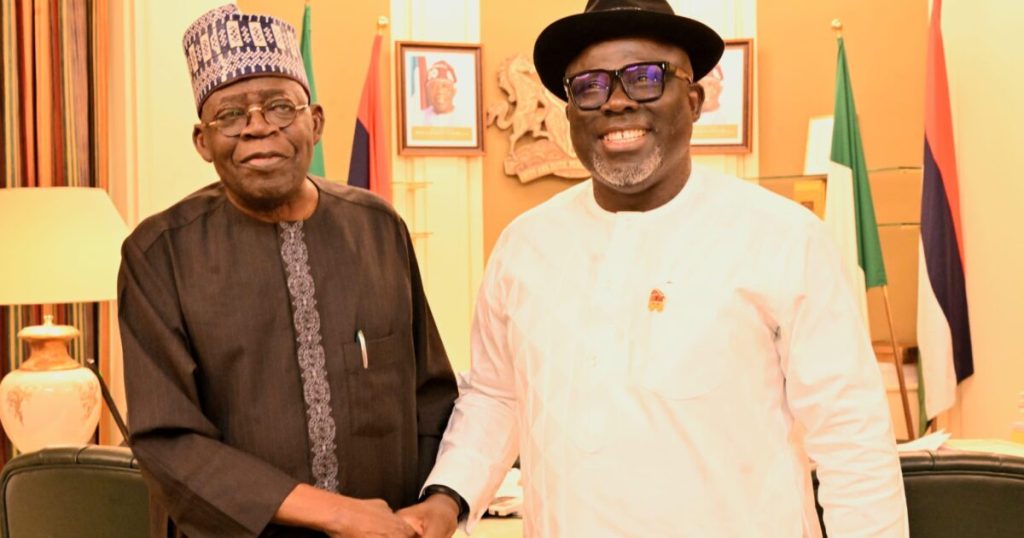Governor Sheriff Oborevwori’s visit to President Bola Tinubu at the Aso Rock Villa signifies a significant political realignment in Delta State, marking a departure from the established political landscape. This meeting, Oborevwori’s first with the President since defecting to the All Progressives Congress (APC) from the Peoples Democratic Party (PDP), underscores the ongoing shift in power dynamics within the Nigerian political sphere. Oborevwori’s defection, along with that of his predecessor, former Governor Ifeanyi Okowa, and a substantial portion of the Delta State political machinery, highlights the growing influence of the APC in a region traditionally considered a PDP stronghold. This move further weakens the PDP’s presence in the South-South region, shrinking its governorship control and raising questions about the party’s future prospects.
The defection of incumbent Governor Oborevwori from the PDP to the APC is a historical event in Delta State politics. Since the return to democratic rule in 1999, the PDP has maintained a firm grip on the state’s governorship. This unbroken streak, spanning over two decades, solidified the PDP’s image as the dominant force in Delta State politics. Oborevwori’s decision to abandon the PDP not only breaks this long-standing tradition but also signals a potential shift in the state’s political allegiances. This move could potentially reshape the political landscape of Delta State, creating new opportunities for the APC and posing significant challenges for the PDP in maintaining its relevance and influence.
The wave of defections from the PDP to the APC, exemplified by the Delta State exodus, reflects a broader trend of political realignment occurring across Nigeria. The PDP, once a formidable force in the South-South and other regions, is experiencing a decline in its political fortunes. This decline is characterized by internal crises, dwindling membership, and a loss of key political figures to the ruling APC. This shift in power dynamics is not limited to Delta State; similar realignments have been observed in Rivers and Cross River, further diminishing the PDP’s foothold in the South-South. These developments raise questions about the PDP’s ability to regroup and regain its former prominence in the political landscape.
The APC’s growing influence in the South-South region, traditionally a PDP stronghold, suggests a potential reshaping of the political landscape. The defections of key political figures, including governors and their supporting structures, contribute to the APC’s expanding reach and influence. This expansion presents both opportunities and challenges for the APC. The party now has the potential to consolidate its power in the region and further solidify its position as the dominant political force in Nigeria. However, managing the influx of new members and addressing potential internal conflicts will be crucial for the APC to effectively capitalize on these gains.
The internal crises plaguing opposition parties like the PDP, Labour Party, and the New Nigeria Peoples Party, coupled with the wave of defections to the APC, present significant challenges for these parties. These crises, often characterized by internal power struggles, factionalism, and disagreements over party direction, weaken the parties’ ability to effectively challenge the ruling APC. The loss of key members to the APC further depletes their ranks and weakens their organizational capacity. These challenges necessitate a period of introspection and strategic realignment for these opposition parties to regain their footing and present a credible alternative to the ruling party.
The current political climate in Nigeria, marked by shifting alliances and internal party struggles, highlights the dynamic nature of the country’s political landscape. The rise of the APC and the decline of the PDP, particularly in regions traditionally considered opposition strongholds, signal a potential realignment of power dynamics. The ability of the APC to effectively manage its expanding influence and address potential internal challenges will be crucial for its long-term success. Similarly, the opposition parties face the daunting task of overcoming internal crises, rebuilding their ranks, and presenting a united front to effectively challenge the ruling party. The future of Nigerian politics will likely be shaped by how these dynamics unfold in the coming months and years.














